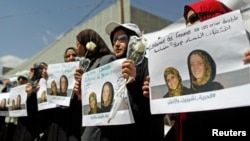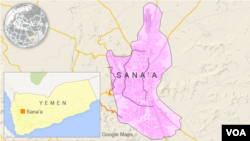A U.S. journalist held in Yemen has been released, but the details of his detention remain unclear as the United States vows to free more Americans in the country.
The U.S. State Department identified the reporter as Casey Coombs, believed to be one of the last American journalists remaining in Yemen after Houthi rebels besieged the capital and ousted the president earlier this year, prompting a foreign military intervention led by Saudi Arabia.
On social media Monday, an image circulated of Coombs immobilized on a stretcher as U.S. Ambassador to Oman Greta Holtz greeted him in Muscat.
State Department spokeswoman Marie Harf declined to provide details on who held Coombs or what medical issues he may be facing.
"U.S. citizen Casey Coombs has departed Yemen and has arrived safely in Muscat, Oman. He is in stable condition," said Harf.
Harf also told reporters Monday that the United States is working to release other Americans being held in the country. As in Coombs' case, the spokeswoman did not specify who was holding the detainees.
"We are aware that several other U.S. citizens are detained in Yemen. We are doing everything we can to obtain the release of these individuals," she said.
News of Coombs' release follows a Washington Post report that four Americans were in Houthi custody in the Yemeni capital Sana’a.
Reporters Without Borders blamed Houthi rebels for the May deaths of two Yemeni journalists, who died in a Saudi coalition airstrike south of Sana'a a day after they were kidnapped.
In a piece published online by The Intercept on May 4, Coombs details his attempts to leave Yemen multiple times after the Saudi air campaign began.
"I was scheduled to leave Sana'a the following day, but I had my doubts," he wrote. "There have been many times I was supposed to leave Yemen: two days ago, a week ago, two weeks ago, and so on. It never happens," said Coombs.
Instead, he found himself among many Americans struggling to escape as the country's infrastructure deteriorated, flights were cancelled, and the U.S. government declined to officially evacuate its citizens.
Earlier Monday, the first video of a French woman kidnapped in Yemen months ago surfaced on social media, showing the distraught 30-year-old pleading with the presidents of France and Yemen for rescue.
French diplomatic officials confirmed the footage of Isabelle Prime posted to YouTube was recorded in April, two months after she and a translator were snatched by uniformed men from a car in the capital Sana'a. Prime worked as a consultant for a firm tied to the World Bank at the time. The translator was later released.
In the 20-second video, Prime addresses French President Francois Hollande and exiled Yemeni President Abdu Rabu Mansour Hadi, asking them in English to work for her release.
"Mr. Hollande and Mr. Hadi, my name is Isabelle. I've been kidnapped 10 weeks ago in Yemen, in Sana'a. Please bring me to France fast because I'm really really tired. I tried to kill myself several times because I know you will not cooperate and I totally understand," said Prime.
The identities of Prime's captors remain unknown. Al-Qaida in the Arabian Peninsula is known to hold foreigners but has not acknowledged a role in the kidnapping.
Her abduction came as Houthi rebels solidified their takeover in Sana'a, and before the start of bombings against the insurgent group by a Saudi Arabia-led international coalition.
The Houthi ouster of President Hadi upended a politically fractured Yemen. The takeover of the capital and subsequent Saudi air campaign triggered what Yemenis describe as an unparalleled humanitarian crisis throughout the country.
The World Food Program (WFP) said Monday that ongoing violence around Yemen's southern port city of Aden forced a ship carrying badly needed food aid to change course and instead dock in Hudaydah on the country's west coast.
The U.N. agency has been staging aid donations in nearby Djibouti before moving the food and medical supplies into Yemen to reach the millions of civilians affected by months of clashes between Houthi rebels and pro-government forces.
A WFP statement said the diverted ship was carrying enough food to feed 60,000 people for a month, and that aid workers would try to travel by road to get supplies to people near Aden who are "in desperate need of food."
Violence continued Monday with Saudi-led airstrikes causing explosions in Sana'a, where the Houthis have been in control since last September.





